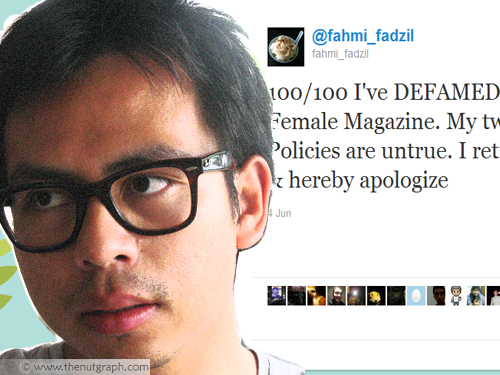THEATRE practitioner, writer and aspiring politician Fahmi Fadzil has become a minor celebrity after agreeing to tweet 100 times that he defamed a publishing company. Fahmi had published a tweet about a pregnant friend who purportedly resigned from Female magazine due to poor human resource practices by her employer, BluInc Media. In his 100-tweet apology, Fahmi said that this was, in fact, untrue.
The unique resolution received international attention from online publications such as The Huffington Post, The Washington Post and The Guardian. It spawned active discussions on Twitter and numerous blog and Facebook postings. Many accused BluInc of bullying Fahmi and being excessively punitive. A few others said Fahmi should have verified his facts before tweeting.

Fahmi and his 100 tweets aside, what this episode demonstrates is this: Tweets and Facebook posts are not immune to defamation suits, regardless of whether the authors’ intentions were noble or innocent. The question is, does this impinge on our freedom of expression? Is this yet another means for those in power to silence legitimate criticism? Or can there be a balance between protecting the freedom of expression and respecting reputations?
Protecting reputations
London-based Article 19, which defends and promotes freedom of expression, has answered some of these questions in a comprehensive document entitled Defining Defamation. It acknowledges a role for defamation laws but is careful to confine it to genuine attempts to “protect the reputation of individuals or entities with the right to sue”.
For certain, Article 19 decries the use of defamation laws to prevent legitimate criticism of the state and state officials and any exposure of wrongdoing or corruption. It also calls for the complete abolishment of all criminal defamation laws, such as those contained in the Malaysian Penal Code, which the state can potentially misuse to silence detractors through imprisonment.
Article 19 also stresses that defamation should not be used to intimidate or harass individuals with the threat of substantial damages or long drawn-out suits that they cannot afford. Remedies should be non-pecuniary wherever possible, such as retractions and apologies. And if damages are awarded, they should never be punitive unless special circumstances where malice and intentional false statements are involved.

What constitutes defamation
Having that in mind, it does seem right that the reputation of individuals and businesses should be protected from untrue or malicious falsehoods. After all, one would hardly like to live in a society where others had complete freedom to publish made-up stories about us being lying cheats, serial adulterers or incompetent buffoons.
Accepting then that there is a small, limited space for the legitimate use of defamation laws, how would this work online?
Firstly, for something to be considered defamatory, it has to be communicated to a third party. It can be written or in auditory or visual form. Published tweets and Facebook posts which are accessible to followers and friends can therefore potentially be defamatory. For that matter, so can text messages, WhatsApp exchanges and Instant Messenger chats. Defamation can still be established even if the tweet, post, chat or SMS was only seen by one person, as long as it was someone other than the party being talked about.
Secondly, the words published must be linked to a specific party’s reputation. In other words, the injured party must be clearly and specifically identifiable. Taking Fahmi’s case as an example, if he had tweeted that his friend had been mistreated by “a publishing company”, it would have been harder for BluInc to establish a claim unless they could prove that he was specifically referring to them. Similarly, a rant against “this cruel and insane world” would also not suffice in a defamation action.
Thirdly, the words published must be shown to lower the injured party’s reputation in the estimation of “right-thinking” members of society, or cause such people to shun or avoid them.
Once defamation is established, the next question is the amount of damages that should be awarded, if any. This would have to take into account several factors. For example, how large a publication’s reach was, and whether there was malice on the author’s part. It would also take into account the reputation of the party who was defamed – the better and more public a defamed person’s reputation, the higher the potential damages.
Defamation online
So, what does this mean for Facebook and Twitter users? No more snide, witty or angry comments on how a restaurant chain gave you bad service? Or about how you were fleeced at your local store? Well, not exactly.
If an encounter is true, and you can prove it, that is an absolute defence. Case law has established, more than a century ago, that the law will not protect someone from injury to a reputation that he or she does not possess to begin with. Relating a personal incident of bad service at a particular restaurant, for example, would not constitute defamation if it can be shown to be true.
Care would, however, have to be taken if repeating someone else’s account of bad service at the said restaurant. If one is unsure whether or not the statement can be proven to be true for whatever reasons, it would be best not to name specific individuals or entities. This would cover online instances such as any retweets or sharing of friends’ Facebook statuses.
An apology unfortunately does not constitute a defence, although it will certainly be taken into account if damages are awarded. In some instances, a court may even decide that damages are unnecessary, as whatever injury to reputation has already been sufficiently rectified by an appropriate retraction and apology.
Another defence that may apply to online users is that of “fair comment on a matter of public interest”. As the phrase suggests, the statement must be “fair”, not malicious or dishonest. Additionally, a “comment” must be something that expresses an opinion, not a fact. And “of public interest” would cover instances such as the conduct of public authorities or something that opens itself to public evaluation, such as a movie, book, theatre performance or piece of architecture.
Freedom of expression
There are certainly enough curbs on freedom of expression in Malaysia that it seems unfair for online users to have to dodge defamation suits as well. Certainly, there have been exorbitant damages awarded in the past which would make defamation laws seem like yet another tool for the powerful to use against the less powerful.
But, applied correctly, defamation laws do play a role in safeguarding everyone’s reputation and hopefully in preventing discussion from degenerating into name-calling and ad hominem attacks. In Malaysia, like elsewhere, citizens must learn to debate the issue and not indulge in derogatory slugfests. And for those who now occupy a public platform through social media, it may be worth their time to understand what constitutes defamation, and the simple steps one can take to avoid legal action. ![]()
Ding Jo-Ann rants about “this cruel and insane world” as jading96 on Twitter.


